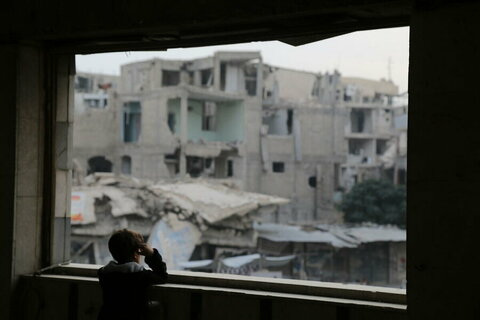Displacement, poverty and rising prices: How one family in Syria bears the burden of 11 years of conflict

“There are many things that we deprive ourselves of,” says Ikhlas, 48. “For instance, fruits are forbidden. Open my fridge and you’ll find it empty.” She is among almost 6 million people in Syria for whom monthly food assistance from the World Food Programme (WFP) is a lifeline.
In recent years, her husband, mother-in-law and three children are constantly driven from one apartment to the next as unrelenting rental prices have pushed even the cheapest of homes beyond their reach.
Then there is food. Prices for essentials are at record highs.
Window on Syria: A WFP photographer looks back at a decade of conflict

She is among almost 6 million people in Syria assisted by monthly World Food Programme (WFP) food rations.
“We eat the minimum amount of vegetables and the simplest dishes,” she says. “We buy that food on credit, of course.”
After more than a decade of conflict, Syrian families are now facing the country’s worst ever economic crisis. Rent, food, medicine and fuel are now out of reach for many families. Humanitarian needs across the country have never been higher. A record 14.6 million Syrians are now in need of humanitarian assistance and nearly 7 million people are displaced – many have had to move more than once.

Ikhlas’s husband works as a casual labourer. But as the country’s economic pressures have grown, the amount of work available has shrunk, leaving him struggling to earn any income at all. “We can’t afford (US$40 –US$60) a month for rent,” says Ikhlas. “I don’t know what to say. The situation is extremely difficult and rough, and it is only getting worse because the prices (of basic items) are still on the rise. Even the bread bundle, the most essential food in any household, has increased in price.”
For the past three months, they have lived in an apartment in Hama. During Syria’s icy winter months there has been no heating or insulation. Instead, Ikhlas has had no choice but to use discarded rubber tyres as fuel – under immense financial pressures, she cannot afford firewood to keep her family warm.
Like many Syrians, Ikhlas’s life was not always this way. Before the conflict, she preserved food during the summer months so that her family would have vegetables to eat year-round. For the past three years, her jars have been filled with water. Preserving food is a luxury for a family who cannot afford to buy food today.
As the economic situation continues to deteriorate in Syria, its impact is acutely felt everyone, not only the poorest or displaced families. The majority of families say they are eating less, cutting meals and going into debt to meet their basic needs. Ikhlas’s family is no different.

“We have two meals a day,” she says. “My mother-in-law eats nothing all day until my youngest son comes back from school. When he does, we have our lunch. Then we wait until my husband is back from work to have our dinner. Two meals a day.”
For Ikhlas, knowing that her son is suffering is one of the hardest parts.
“My son cried before leaving for school, because I didn’t have anything to give him as a snack for the day, not even an apple like other children. There is nothing.”
The oil and pulses are the parts of the WFP food ration she appreciates the most, as she cannot afford to buy these items anymore.
“Survival would be extremely difficult if it wasn’t for this monthly food assistance we are getting. It really helps us so much. The items I use the most for cooking (from the food parcel) are rice, and chickpeas which I grind and make falafel,” she said.
“Everything is expensive now, so this support is much needed.”
Ikhlas’s only dream is a better future for her children where they will not have to go through what she had been though. “I pray for my children to have better days ahead and a home of their own,” she says.



